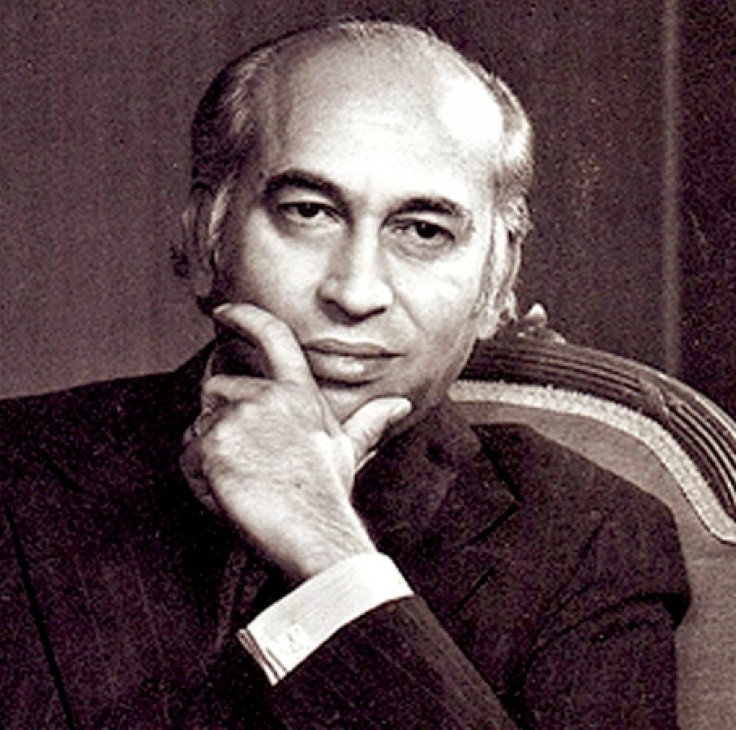Zulfikar Ali Bhutto: A Legacy Of Fragile Democracy In Pakistan 34 Years After His Execution (VIDEO)

As Pakistan prepares for what it hopes will be a peaceful electoral transition from one civilian government to the next in May, the country is observing the 34th anniversary of the death of the founder of its biggest political party and family dynasty.
On April 4, 1979, Zulfikar Ali Bhutto, former prime minister and founder of the Pakistan People’s Party, was executed by hanging by order of the military dictator Gen. Muhammad Zia ul-Haq.
Zulfikar founded a dynasty that could be compared with the Nehru-Gandhi clan in India and the Kennedys and Bushes of the United States.
Zulfikar’s daughter, Benazir, became prime minister for two terms before she, too, suffered a premature death, felled by unknown assassins while campaign for re-election in December 2007.
Zulfikar’s son-in-law, Asif Ali Zardari, is Pakistan’s incumbent president, while his grandson, PPP Chairman Bilawal Bhutto Zardari, is now the presumed heir to the throne.
Despite his execution at the early age of 51, Zulfikar continues to hold a powerful influence over Pakistan.
Born in 1928 in Larkana (then part of British India, now in Pakistan), Zulfikar came from a prominent family of Sindhi landowners and received his education as a lawyer in Oxford University in England and the University of California at Berkeley.
Returning to Pakistan in the 1950s, Zulfikar joined the government as a Cabinet minister in President Iskander Mirza’s administration, eventually rising to foreign minister in 1963 under the military dictator Ayub Khan.
He espoused a strongly nationalistic ideology, tempered by economic socialism.
In his personal life, Zulfikar married his second wife, Begum Nusrat Ispahani, who was of Iranian descent, in 1951. Their first child, Benazir, was born in 1953. They would subsequently have three more children.
As a politician, Zulfikar developed a reputation for fierce hostility to India and enthusiastically supported an aggressive line with respect to the disputed territory of Kashmir, which led to a brief war in 1965. He also moved Pakistan closer to China, as well as to fellow Muslim nations, including Saudi Arabia.
Out of government by 1967, Zulfikar founded the PPP and ultimately rose to the presidency after the crisis in East Pakistan in 1971 that led to a bloody independence war and the creation of the new nation of Bangladesh.
Once in power, Zulfikar imposed emergency rule and later switched to the premiership, which was just empowered with far more authority than before. Among other major acts, he encouraged the development of Pakistan’s atomic bomb program and nationalized many key industries.
In 1973, he was largely responsible for crafting the constitution that has served as a blueprint for Pakistan’s long, slow crawl toward democracy.
But he never lost his fear and hatred of India.
He once delivered the following threat to his giant neighbor: “Pakistan will fight, fight for a thousand years. If.. India builds the bomb.... [Pakistan] will eat grass or [leaves], even go hungry, but we will get one of our own. ... We have no other choice!”
(India tested a nuclear weapon in 1974, but Pakistan did not until 1998.)
But at home economic stagnation and rebellion in Baluchistan province (which led to thousands of deaths) soured much of the country to Zulfikar. By the summer of 1977, despite the PPP having won parliamentary elections, Zulfikar was deposed by army chief Zia, who took power in a bloodless coup.
Zia charged Zulfikar with the murder of a political opponent, leading to the Supreme Court sentencing the former prime minister to death.
Even in his jail cell, he continued to advocate for Pakistan to become a nuclear power.
“We ... know that [Israel] and [South Africa] have full nuclear capability -- a Christian, Jewish and Hindu civilization have this capability ... the Islamic civilization is without it, but the situation (is) about to change,” he said.
Farahnaz Ispahani, a former member of the National Assembly, wrote in Pakistan’s Dally Times that Bhutto was Pakistan’s “first popularly elected” democratic politician.
“He is still mourned today, unlike any other political leader born in our land,” Ispahani wrote.
“His political journey, as well as his assassination, gave birth to an enduring legacy. … Zulfikar Ali Bhutto changed the history of Pakistan by empowering citizens to have a voice. His voice was silenced. “
© Copyright IBTimes 2024. All rights reserved.











